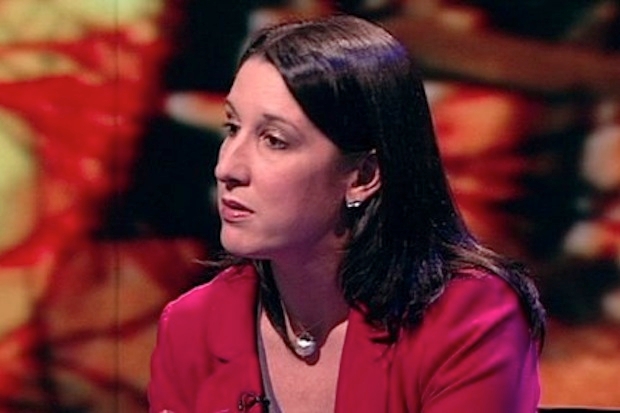I’ve never met the woman that the Newsnight editor Ian Katz last night accidentally described as ‘boring, snoring Rachel Reeves’, so for all I know, the shadow chief secretary to the Treasury might be an absolute riot. Although actually, writing that, it occurs to me that maybe I have and she was just too boring for me to remember. Perhaps we sat next to each other at some sort of function, and had a fun chat about, ooh, fiscal prudence in a post-OBR paradigm, which involved her talking and me going ‘Mmmm’, and left her thinking, ‘He seems nice, I wonder if we’ll be friends?’ as she walked dreamily to the Tube, only for me never to call because the whole experience had immediately slipped from my mind like water slips from a raincoat, ultimately leading to her reading this, now, and being struck with righteous, albeit boring, fury.
In which case, sorry. But ‘Wow! Who is THAT?’ is something which nobody watching Newsnight will have said. Asked whether this woman could one day be prime minister, a focus group would have replied, ‘Dunno, sorry, I wasn’t actually listening.’ Katz didn’t mean to broadcast his criticism (it was a private message on Twitter, which went wrong like they always do), but his criticism was nonetheless quite fair. This wasn’t a shy victim doing her best. This was conscious boringness, designed to make the watching public give up and go away.
Lots of politicians do it. Gordon Brown only did it, except for on the rare occasions that he tried smiling and looked like a serial killer. And I don’t think they realise the harm they do. In the Times last week, m’colleague Tim Montgomerie hailed the election of Tony Abbott in Australia as a triumph of the BoreCons — solid, dull, centre-rightists, quietly getting on and governing. See also Angela Merkel, he wrote, and a slew of other people I’ve barely heard of from places such as New Zealand and Canada. His point was about boring policies as much as boring personalities, but this was all still very much the Reeves approach to ruling the world. People don’t want to be thrilled, is the idea. They want solidity and competence. They don’t want Berlusconi, but the next guy, whoever he is. Slip under the radar. Get stuff done.
The problem with this, though, is that it divorces governance from debate. Writing in this space a few years ago, at about this time of year, I noted that something had gone awry with the unspoken order of precedence at party conferences. Aside from at the very top, I’d realised — the Prime Minister and party leaders — all the superstars were journalists. They dance across the airwaves, speaking to each other, at the centre of every interesting huddle at every interesting party. Actual politicians skulk in the background, shabbily suited, and with resentful eyes. This, I suspect, is where a lot of that Westminster Leveson fury came from. You spend a career climbing the greasy pole but, every time you have a conversation at a drinks party, people are peering over your shoulder to see if they can spot Piers Morgan or Rebekah Brooks.
What do you expect, though? The performative aspect of politics matters. It’s where it all begins. We talk as though it’s shallow, that magic sparkly thing that Boris Johnson or Nigel Farage can do, and in many respects it is. But a politics dominated by politicians who come across like Rachel Reeves is a politics which has given up trying; which has such a low estimation of its electorate that it can no longer be bothered even to engage them in conversation. In the end, Katz apologised, which was his mistake. He should have doubled up. ‘Yeah,’ he should have said. ‘I said “boring”. And if you ever want to come on my show again, you had better do better than that.’
This is an extract from Hugo Rifkind’s column in the next issue of The Spectator, which will be available on Thursday.







Comments